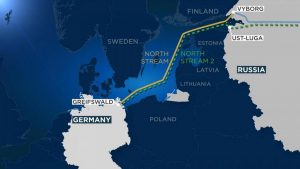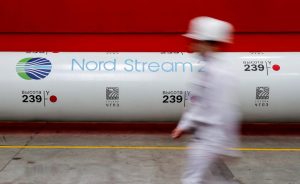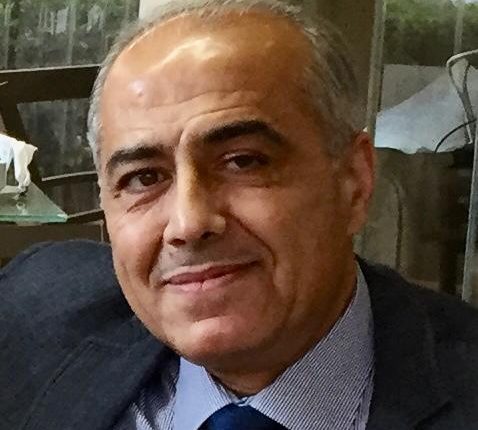RUSSIA: THE EUROPEAN GAS PLATFORM
By General Monzer El Ayoubi
Translation: Dr Pierre A. Sarkis

On the day the pumping of liquified gas started from the Russian city of Vyborg to the German city of Kriegsfeld in November 2012, through the North Stream Pipeline, Russian President Vladimir Putin looked at the European map, considering that his strategic decision was achieved, for it goes beyond commercial investment and economic development, as its dimensions and geopolitical consequences are the most important “handcuffing of Europe with the gas belt” and Russian constraint.
Next, the second phase of the construction of the gas line known as Northstream 2 faced fierce opposition from the United States of America, which approached a rivalry or political engagement with several European countries. This applied particularly to its ally Germany- the most important member of NATO- the main partner in the project and the estuary country, in the form of sanctions against Russian giant Gazprom and the participating entities, such as, German Uniper and Ventershall, British-Dutch Royal Dutch, French Angie and Austrian OMV.
With punitive and prohibitive sanctions levied by the US not having any impact, for after years of starting work, September 2021 saw the launch of pumping in the new NorthStream 2 pipeline, the world’s longest gas line of 1,230 km. It extends into the depth of Baltic Sea waters towards Germany and some European countries at a cost of $10 Billion, raising the capacity of Russian gas feeding to 55 billion cubic meters in 2030. It also makes Russia the strategic adversary of the United States and NATO, the European-accredited backbone in the field of energy for the medium and long-term range.

In tandem, and with the opening of the venture, European observers said Washington’s positions were not related to security concerns or strategic threats, but to its commercial interests in supplying Europe with shale gas, and the consequences of its massive costs. At the same time, the German machine under Chancellor Angela Merkel, succeeded in reaching some kind of settlement that led to US President Joe Biden’s decision to lift the sanctions temporarily, noting the clause “taking punitive measures against Moscow in case the latter took advantage of the situation and used the energy pipelines in the future, as a weapon for further acts of aggression.”
In parallel, Ukrainian President Volodymyr Zelensky declared NS2 “a dangerous geopolitical weapon” in Moscow’s hands, undermining Kiev’s influence and ability to confront, depriving it of $1.5 Billion a year which is the price for Russian gas to cross through its territory to Europe. In a related context, Kiev’s concerns about losing Russian Billions prompted the German government to mediate with Moscow in order to renew the use of Russian gas passage through its territory. During an earlier meeting with German Chancellor Merkel, Putin did not reject her desire and mediation, as he assured her of his country’s commitment to a gas pass with Ukraine to the end, especially after he grabbed the hammer of economic pressure in the face of the Ukrainian rebellion.
In contrast, and as part of the economic war in the field of energy resources with the support of Washington and the European Union, Turkey, Romania, Bulgaria, Austria and Hungary signed an agreement last July to build the Nabucco natural gas pipeline which is mainly linked to the pipeline from Baku, the capital of Azerbaijan, extending from the Turkish region of Erzurum to Austria’s Baumgarten an de March, with a length of 3,300 km and an infusion capacity of 31 billion cubic meters per year. Furthermore, the Nabucco line will be in its objectives, and once completed with the purpose to divert Europe’s supply of natural gas from passing through Russia, the latter considered it a project outside the framework of trade competition and hostile, which falls within the economic conflict with a geopolitical background, outside the randomness of the supply of gas energy.
In the results, it seems clear that Nabucco is beyond the opportunity to invest as its immediate objectives will be to reduce or strip Moscow of its ability to use NorthenTorrent 1 and 2, as a means of pressure and subjugation to the countries of Europe if necessary. In addition, unilateral pumping will lead to a state of deficiency through a “decision”, or an “involuntary” disturbance in deliveries, to complications at all European levels, not the least of which, are the lack of warmth and the cessation of industrial production.

On the other hand, and in the collection of observations and monitoring of Kremlin policy during his years in office, Russian President Vladimir Putin leaves no opportunity, and does not eliminate any means of exploiting international needs and events for the benefit of his country, and at the right time. He also proved his ability to make the event, and then invest it based on his guidelines at several levels that serve Russian foreign policy in its totality. From a purely strategic perspective, NorthTorrent 1 and 2 pipelines have proven Russia as an indispensable natural gas extraction and supply platform for much of the old continent, and the branching web distribution network is besieging the countries of Eastern Europe and the Ukraine which are opposed to her.
In concluding, the geopolitical conflict with Europe is being treated by the Kremlin with a golden balance, without excluding the nuclear edge or the classic military confrontation when necessary, such as the military intervention in the Ukraine and the annexation of the Crimea to the Russian Federation in 2014, making the Crimean Republic and the federal city of Sevastopol two Russian federal entities. The sources of danger and threats which Moscow faces at the military and security levels, as well as, the fight against terrorism, extremism, cyber warfare and other challenges, are subject to a level of confidence in the national capabilities for confrontation, which has always proved to be effective and superior. It remains to be noted that one of the main sources of confidence, is the success of the Russian President in pulling together the pieces of the former Soviet Union through politics at times, or brandishing his enormous and evolving military arsenal at other times, while consolidating his country as a global pole partner in ruling the planet with the United States of America.
Scholar in Security and Strategic Affairs
Beirut, 24/10/2021

